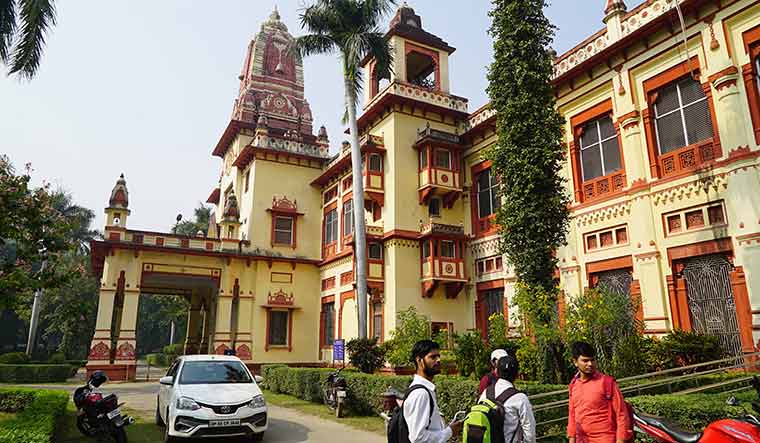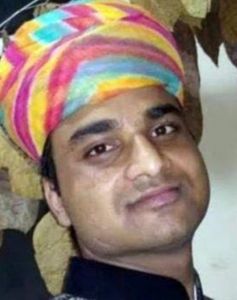UNDER A FACILE calm that hangs over the Banaras Hindu University (BHU) campus, there is a growing clamour of questions about religion, the purpose of education and the spirit of the Constitution. The man at its centre, Firoze Khan, a doctorate in Sanskrit who was selected to teach literature, is quiet. And terrified. He repeatedly apologises for his refusal to answer our queries. “Please understand,” he tells THE WEEK.
For two weeks, a bunch of students, mostly from the Akhil Bharatiya Vidyarthi Parishad, sat in front of Holkar Bhawan, which houses the BHU’s recruitment cell, demanding that Firoze not be permitted to enter the Sanskrit Vidya Dharma Vijnan Sankaya (SVDV, the Sanskrit faculty). They claim to draw support from a marble slab mounted on a wall of the SVDV. A rough translation of the injunction on the slab states that the building must only be used by Hindus, including Sanatanis, Arya Samajis, Jains, Buddhists and Sikhs, for cultural and religious purposes, for the recitation of religious accounts, discussions on shastras and for the expositions of leaders from within the country and outside. The protesters object not to Firoze’s teaching of Sanskrit, but to his presence in a building where religious chants regularly emerge from one of its eight departments—Veda.
Upendra Kumar Tripathi, head of the Veda department, says the courses include both Vedic literature and karmkand (rituals performed by Brahmins). “He has not been appointed to this department, but there are certain rituals that members of this faculty perform on various occasions such as the foundation day,” he tells THE WEEK. “For a non Hindu, this could become problematic over time. How would Muslims take it if a Hindu were to read ayats (Quranic verses) in a mosque? The appointment was a progressive step, but perhaps there were practical difficulties.”
Upendra points out that his department encourages scientific research on the Vedas, and has had many non-Indians as students. He, however, does not remember seeing a Muslim student or teacher since 2006, the year he joined. He is also emphatic that the marble slab that the protesters have upheld was not put up during the lifetime of BHU’s founder Pandit Madan Mohan Malaviya—the present SVDV building was constructed in 1950, and Malaviya died in 1946. “Malaviyaji saw Hindusim as a philosophy, as a way of life, not a religion,” he says.
This exposition is upheld by The BHU Act (repeatedly cited by the protesters), which states, “The university shall be open to persons of either sex and of whatever race, creed, caste or class, and it shall not be lawful for the university to adopt or impose on any person any test whatsoever of religious belief or profession in order to entitle him to be admitted therein, as a teacher or student, or to hold any office therein... except in respect of any particular benefaction accepted by the university, where such a test is made a condition thereof by any testamentary or other instrument creating such benefaction....”
Shitala Prasad Pandey, a professor in the Dharmagam department of the SVDV, tells THE WEEK, “Knowledge is not the preserve of an individual or a religion. Any religious text can be taught and learnt by anyone.”
At the Aligarh Muslim University, which has been dragged into the controversy by protesters who question why Firoze should not find employment there, Raihan Akhtar, assistant professor of Sunni theology, says that the whole issue has been muddled by confusing knowledge, faith and their interrelation. “Anyone is free to gain knowledge about faith,” he says. “I teach Hindu texts such as the Ramayan and draw comparisons with Islamic beliefs. But to have knowledge about faith and to have faith are different orders. Why mix the two?”
This is not the view of many teachers in BHU’s Sanskrit faculty that THE WEEK spoke to. A strong strand of opinion is that the BHU, under Vice-Chancellor Rakesh Bhatnagar, is adopting an increasingly liberal attitude at the cost of practical considerations. “He is trying to show that the university is changing radically under him. But why take steps that are sure to foment trouble? This is a huge campus, with porous boundaries. Incidents of violence are not unknown here. How would the VC assure that Firoze remains safe at all times?” asks a faculty member. Another member says that Bhatnagar’s insistence on projecting a liberal character kept them from voicing their practical fears to him. A third view is that the interview committee that selected Firoze was deliberately composed of communists.
One of the interviewers was Radhavallabh Tripathi, a progressive Sanskirt scholar, critic and writer. He tells THE WEEK that Firoze is “exceptionally brilliant” and that the protesters had made a joke of the BHU’s great traditions. “We appointed a good scholar bearing in mind that he would become an example,” he says. “Literary theory has nothing to do with religious rituals. These (rituals) should be taught in temples and ashrams. The Vedas should be looked upon as literature. The opposition makes a mockery of all norms of education and University Grants Commission guidelines.” He adds that if Firoze is not permitted to join, it is the BHU’s loss, and that any foreign university would be happy to have him.
Among BHU students, there is a growing resentment that the authorities deliberately let the protests linger. Vikash Maurya, a postdoctoral student, says, “Protests are common here. But even for small demands such as an increase in the number of toilets for girls, crackdown is swift. By allowing these protests to grow, the authorities perhaps hoped to draw away attention from other genuine demands.”
The protest has been called off, but the boycott of the classes continues. Firoze, meanwhile, has applied for a teaching position at the BHU’s faculty of Ayurveda in the department of Samhita and Sanskrit, for which he will be interviewed on November 29. Whether the university’s frail peace will hold after that remains to be seen.



